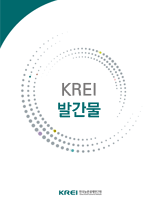요약문
우리 농업의 대내외 여건은 농업분야 부가가치 성장의 정체와 같은 위기적인 요소와 동북아시아 농식품시장의 성장 등 기회적인 요소가 공존하고 있는 상황이다. 이러한 때에 동북아시아 농식품시장의 기회를 활용하고 국내 농업분야의 신성장 동력을 마련하고자 서해안 간척지를 활용해 농식품산업특구를 조성하자는 논의들이 이루어지고 있다. 농식품산업특구는 농식품산업이라는 산업적 특수성과 입지정책이라는 공간적 특수성을 결합한 개념으로 기존의 산업단지나 지역특화발전특구와는 산업적·운영적 측면에서 차별화 되는 정책이다. 그런 점에서 기존의 산업단지나 지역특화특구의 제도적 기반으로 농식품산업특구을 조성·운영하는 것은 실효성 측면에서 바람직하지 않다. 그간 다른 특수목적산업단지들이 개별법률을 제정하여 법적 근거로 삼고 있는 것처럼 농식품산업특구도 새로운 법적 근거아래 조성·운영되는 것이 바람직하다.
이에 농식품산업특구의 개념과 필요성을 제시하고 제도적 기반으로 ‘(가칭)농식품산업특구 지정 및 지원에 관한 특별법’의 구체적인 내용을 제시하는 본 연구는 향후 우리 농업의 미래 경쟁력 제고를 위한 농식품산업특구의 조성 및 운영에 매우 필요한 연구가 될 것이다.
This study aims to investigate about the `agro-food special zone': what it is, why the special zone is needed in the field of agro-food business, and what contents are included in a new special law as institutional foundation
The agro-food special zone is a concept that combines the industrial uniqueness and locational specificity of the agro-food business. It is a special industrial complex introduced to strengthen the competitiveness of the agro-food industry.
In this study, we examined, first, the operational status of government policies on industrial spatial development at home and abroad, and then the operational status of the general `industrial complexes,' which are one of the most typical forms of industrial spatial development in Korea. We also reviewed the current situation of `specialized regional development zones' administered by local autonomous governments carrying out specialized projects to revive the local economy.
Comparable to the agro-food special zone, the `industrial complexes' are mostly based on the manufacturing industry and are, therefore, not so closely related to the agro-food business. Located in rural areas, the `agricultural complexes,' too, have the characteristics of having very weak connections with agro-food business, while the machine and petrochemical industries are main businesses in the agricultural complexes.
In the meantime, specialized regional development zones are designated and operated by mostly local governments with their legal basis founded on separate statutes overseeing the regional development of special zones.
The uniqueness of the special agro-food zone is that it is centered around agro-food businesses rather than the manufacturing industry of existing industrial complexes and that, unlike the specialized regional development zones operated by local governments, it is supervised by the central government.
The need for agro-food special zones arises in three aspects: first, to find a new engine of growth to counter the weakening competitiveness of the domestic agro-food industry and build a new model for industrial development; second, to take advantage of opportunities in Northeast Asian agro-food markets; and third, to cope with the supply-demand imbalance of world grains and secure food security.
There are three types of agro-food special zones: the `integration-type' located mostly on reclaimed land, the `belt-type' linking major agricultural production areas, and the `resource management-type' focused on managing natural resources. A construction model is suggested for the integration-type special zone since it is relatively easier to develop based on planning with an economic feasibility study.
The Northeast Asian agro-food market has been growing continuously and the `integration-type' is expected to act as a regional hub through efficient use of reclaimed land in the western coastal regions of Korea. To achieve such a goal, a strategic direction is made; that is, build a global production base that achieves the scale of economy through large-scale combined farming; develop a convergence economy that combines the primary, secondary, and tertiary industries; and build a foundation for green growth using the low-carbon eco-environment system.
An economic feasibility study was performed to measure the direct, indirect and induced effects of an agro-food special zone built on a land mass of 2,000 hectare. Also, a study was conducted to analyze the profitability and synergy effects of assisting a company that would do a horticulture business in the special zone with high-tech green houses made of glasses. According to the study, the economic effect is estimated to surpass 14 trillion won(14.4732 trillion won), which is 4.3 times larger than the estimated project cost, and create 29,461 new jobs across all fields.
If investment is made to support the company doing a businesss with high-tech glass green houses, it can contribute improving the global competitiveness of agriculture, replacing the import of high-tech glass green houses, fostering experts, stimulating production and creating jobs.
It is better to legislate a special law and make it as institutional basis for constructing and managing agro-food special zones than to utilize current laws made for industrial complexes development because the laws do not properly reflect the uniqueness of agro-food business. Moreover, in the sense of laws related to special industrial complexes, it is consistent with precedents to legislate a new special law for agro-food special zones because special industral zones have legal foundation with their own specialized laws.
As for the contents of the law, the special law should include guidelines on construction, management, and promotion of agro-food special zones in addition to the general principles covering the purpose of the law and related terms.
The special law should also clearly stipulate contents related to setting up of a master plan and designation, development, and management of agro-food special zones, including contents related to setting up of a supervising organization and a basic management plan. The law should cover contents related to assisting the special zone developer and companies that wish to move into an agro-food special zone, as well as contents related to exceptions, approvals and authorization.
구매안내
KREI의 출판물은 판매 대행사 (정부간행물판매센터)와 아래 서점에서 구입 하실 수 있습니다.
판매대행사
- (주)정부간행물판매센터http://www.gpcbooks.co.kr사이트 바로가기
- 서울특별시 중구태평로 1가 25번지
- TEL 02) 394-0337, 734-6818
- FAX 02) 394-0339
판매서점


